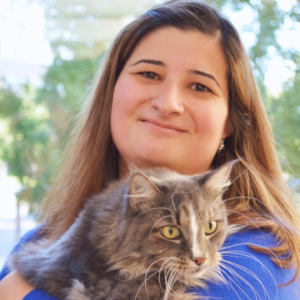Partnering with the Best: Inside the Cornell Veterinary Biobank
July 20, 2020 - 4 minutes readAt the Dog Aging Project, we believe that interdisciplinary collaboration encourages innovation and results in creative solutions to complex problems. Our team includes researchers, scientists, and veterinarians from many disciplines at over twenty top institutions. One of our key partners is Dr. Marta Castelhano, the director of the Cornell Veterinary Biobank at the Cornell University College of Veterinary Medicine and a member of the Dog Aging Project Team.
A veterinary biobank is a “library” of samples and associated data, which are used for research. Biobanked samples might include blood, tissue, DNA, or other kinds of samples that can be collected from dogs or other animals. Some biobanks focus on specific sample types such as cancer tissue. Others focus on collecting biological samples from specific populations or geographical regions. The samples not used for immediate analysis after collection are stored frozen, on slides, in paraffin, or using other preservation techniques. To ensure that research performed using the samples will result in real, tangible benefits for animal and human health, it is imperative that a biobank is operated at the best possible standard.
The mission of the Cornell Veterinary Biobank is:
To serve the research community by helping accelerate biomedical research as an accredited resource for standardized biospecimen collection and archiving. Our goal is to improve animal and human health, by promoting translational research (bench to bedside) that will ultimately result in precision medicine advancements with more effective, better targeted, and less toxic therapies.
 Dr. Castelhano and her team of specialists at the Cornell Veterinary Biobank collect, process, test for quality, store, and distribute biological samples according to procedures accredited to an International Organization for Standardization (ISO) standard. In fact, the Cornell Veterinary Biobank holds the accolade of being the first biobank in the world to be accredited under ISO 20387: 2018 Biotechnology — Biobanking — General requirements for biobanking. This accreditation signifies that the Cornell Veterinary Biobank meets the highest possible standards for biobanking and is foremost in helping the entire field elevate their quality control and assurance practices.
Dr. Castelhano and her team of specialists at the Cornell Veterinary Biobank collect, process, test for quality, store, and distribute biological samples according to procedures accredited to an International Organization for Standardization (ISO) standard. In fact, the Cornell Veterinary Biobank holds the accolade of being the first biobank in the world to be accredited under ISO 20387: 2018 Biotechnology — Biobanking — General requirements for biobanking. This accreditation signifies that the Cornell Veterinary Biobank meets the highest possible standards for biobanking and is foremost in helping the entire field elevate their quality control and assurance practices.
Recently, the Dog Aging Project and the Cornell Veterinary Biobank were jointly awarded an addition to our grant from the National Institute on Aging to build and launch the Dog Aging Project Biobank, a collection of biological samples to be housed at Cornell University.
Our team will be collecting many different types of biological samples from a subset of dogs participating in the Dog Aging Project. Some of those samples and their associated data will be banked at our Dog Aging Project Biobank where other researchers will have access to them. This continues our existing commitment to open data.
One of our core values at the Dog Aging Project is the belief that the data we are collecting is a public good, which should be shared widely. Any researcher who wants to use samples collected by our project will be able to apply for access through the Dog Aging Project Biobank. This kind of sharing is critically important for the advancement of science because it allows for new hypotheses to be tested as new research tools become available. As Dr. Castelhano pointed out in a recent presentation to the Dog Aging Project:
Every time you donate a sample to our biobank, we make a commitment that we’ll use it as an investment toward a better future for animals and people through research. It is a partnership in science.
We’re thrilled to partner with Dr. Castelhano and the Cornell Veterinary Biobank! They really are the best of the best!
Tags: Inside Science